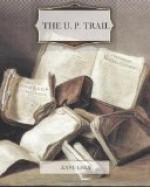Then came his siege with the rails. That was labor which made carrying ties seem light. He toiled on, sweating thin, wearing hard, growing clearer of mind. As pain subsided, and weariness of body no longer dominated him, slowly thought and feeling returned until that morning dawned when, like a flash of lightning illuminating his soul, the profound and exalted emotion again possessed him. Soon he came to divine that the agony of toil and his victory over weak flesh had added to his strange happiness. Hour after hour he bent his back and plodded beside his comrades, doing his share, burdened as they were, silent, watchful, listening, dreaming, keen to note the progress of the road, yet deep in his own intense abstraction. He seemed to have two minds. He saw every rod of the ten miles of track laid every day, knew, as only an engineer could know, the wonder of such progress; and, likewise, always in his sight, in his mind, shone a face, red-lipped, soulful, lovely like a saint’s, with mournful violet eyes, star-sweet in innocence. Life had given Allie Lee back to him—to his love and his memory; and all that could happen to him now must be good. At first he had asked for nothing, so grateful was he to fate, but now he prayed for hours and days and nights to remember.
The day came when Neale graduated into the class of spikers. This division of labor to him had always represented the finest spirit of the building. The drivers—the spikers—the men who nailed the rails—who riveted the last links—these brawny, half-naked wielders of the sledges, bronzed as Indians, seemed to embody both the romance and the achievement. Neale experienced a subtle perception with the first touch and lift and swing of the great hammer. And there seemed born in him a genius for the stroke. He had a free, easy swing, with tremendous power. He could drive so fast that his comrade on the opposite rail, and the carriers and layers, could not keep up with him. Moments of rest seemed earned. During these he would gaze with glinting eyes back at the gangs and the trains, at the smoke, dust, and movement; and beyond toward the east.
One day he drove spikes for hours, with the gangs in uninterrupted labor around him, while back a mile along the road the troopers fought the Sioux; and all this time, when any moment he might be ordered to drop his sledge for a rifle, he listened to the voice in his memory and saw the face.
Another day dawned in which he saw the grading gangs return from work ahead. They were done. Streams of horses, wagons, and men on the return! They had met the graders from the west, and the two lines of road-bed had been connected. As these gangs passed, cheer on cheer greeted them from the rail-layers. It was a splendid moment.
From lip to lip then went the word that the grading-gangs from east and west had passed each other in plain sight, working on, grading on for a hundred miles farther than necessary. They had met and had passed on, side by side, doubling the expense of construction.




